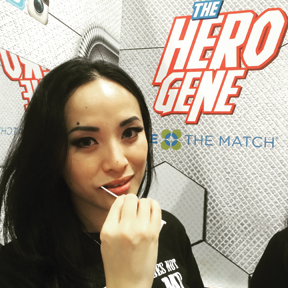Achievement unlocked: Area 23’s Hero Gene campaign makes first possible patient match
At 2015’s New York Comic Con, Area 23 teamed up with Be The Match to launch The Hero Gene Lab, an effort to expand the number of people registered to be bone marrow donors. Bringing a laboratory-themed booth to the convention, Area 23 managed to get cheek swabs from about 500 people with their registry sign-ups. And in May, the agency announced the first match from the program: Sophie Chou, 28, who was swabbed on Oct. 9, 2015, and received the call April 29, 2016, that she was the match for a woman with blood cancer.
Renee Mellas, co-managing director of Area 23, says Chou’s hero journey has just begun. “The next steps are further testing: either another cheek swab or blood tests to confirm that she’s the best match for this patient,” Mellas says. “After that, she’ll have a physical, etc, to make sure she’s in good health and then after that, it mostly depends on the patient and getting her ready for transplant: intense rounds of chemo to wipe out her immune system to prepare her for transplant.
“A lot can happen in this stage, it’s very tough physically on the patient and the donor. This stage could take months. Doctors are asking her to do the actual bone marrow-type of donation, the more invasive of the two procedures. Our donor is 100 percent committed. Her friends, family and employer have totally rallied around her.”
The announcement of a donor match coming from the program has particularly thrilled Abby Stellpflug, VP, group art supervisor at Area23, who came up with the idea of generating interest in the donor registry. “I was concepting for another project when I came across Be The Match and immediately decided to register myself,” she says. “I thought it was such a simple way to actually save a person’s life and to be a real-life hero; an idea that I think is truly compelling.”
Although not into comics herself, Stellpflug only had to look at the team of creatives she sits next to at Area 23, “huge fans” who attend New York Comic Con every year. “It dawned on me that people that attend these cons and worship heroes would probably be even more compelled by the desire to be a hero in real life,” she says.
The agency did some surveys and found that the theory was correct, with comics fans being four times more likely to be registered organ donors and to donate blood.
The campaign plays on the common superhero story theme that a hero possesses a mutant gene that gives them their powers. At the agency’s New York Comic Con booth, attendees could do a simple DNA test that would reveal if they possessed the coveted “Hero Gene” and register them with Be The Match. After swabbing, attendees then inserted their test kits into the interactive Hero Gene incubator which “analyzed and cross-referenced their DNA” to reveal their results. Attendees also shared #swabbieselfies on social media to help spread the word and to brag about possessing the Hero Gene to fellow comic fans. Stellpflug says this drove 100 more people to sign up online at join.bethematch.org/yourherogene, which allows a Hero Gene test kit to be mailed directly at home.
The creatives involved in The Hero Gene Lab are Chris Bernesby, a fan of Captain America; Andy Gerchak, who favors Batman; and Sam Pizarro, who likes Thanos, the Mad Titan. Production manager Frank Laport came up with the booth design.
“These four guys are MY heroes for helping bring this project to life,” Stellpflug says. “Our favorite comic artist, Jim Palmiotti, quickly became the writer and inker, because he was such a big Hero Gene supporter on social media.”
Palmiotti has worked on titles such as Daredevil, Punisher, Deadpool, Catwoman, Supergirl, Jonah Hex, and his own series Painkiller Jane, which he also wrote when it was made a series on the Sci-Fi Channel starring Kristanna Loken. He is currently working on the Harley Quinn series from DC.
According to Stellpflug, Chou said as soon as she heard about the registry, “it was an easy decision to donate and be registered, because every person listed helps a patient’s chances.
“As a former oncology researcher, she knows the slim odds of finding a match (1 in 500 people will ever be called up and asked to donate) and so she felt that by swabbing she was ‘doing her part,” Stellpflug says.
Chou knows that her match is a 48-year-old woman with blood cancer but she won’t learn much more about the patient until, potentially, one year after donation when they may have the opportunity to meet in person, if both parties consent. “So much depends on the patient at this stage,” Stellpflug says.
Though The Hero Gene Lab is not slated to be back at New York Comic Con this year, “as there are comic cons in nearly every city of the country going on all year round, and because we’ve found such a motivated, untapped audience, we’re working hard along with Be The Match to find a sponsor/partner to be able to find more heroes,” Stellpflug says.
Mellas is happy for the success of the program, particularly since it highlights that the pharma and medical advertising industries “do good things for people.”
“This is an inspiring story that could motivate others to donate bone marrow as well or to take up another cause to do good,” she says.


